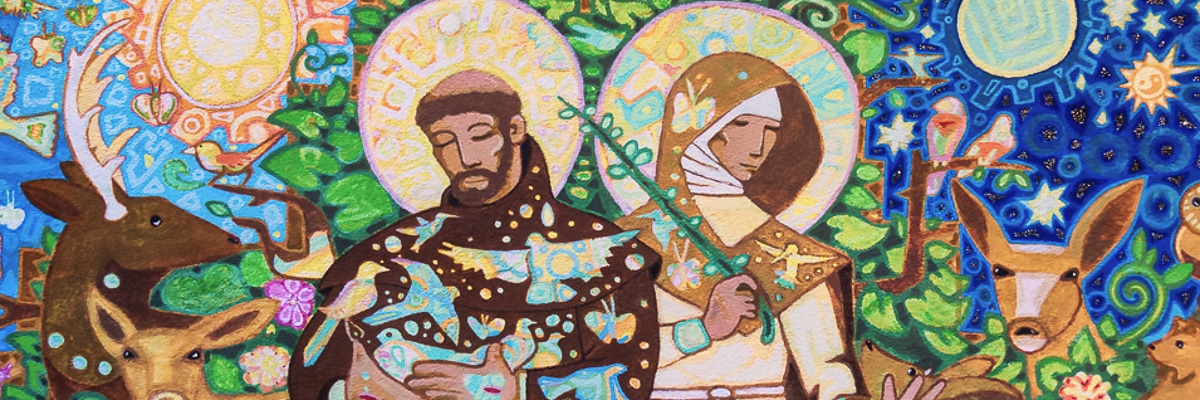
Sunday
Francis of Assisi succeeded in living in a single-hearted way, in which his only goal was to love. This intense eagerness to love made his whole life an astonishing victory for the human and divine spirit and showed how they work so beautifully together.
—Richard Rohr
Monday
Francis was a fundamentalist—not about doctrinal Scriptures—but about lifestyle Scriptures: take nothing for your journey; eat what is set before you; work for your wages; wear no shoes. This is still revolutionary thinking for most Christians, although it is the very “marrow of the gospel,” to use Francis’ own phrase.
—Richard Rohr
Tuesday
Until we discover the “little way,” we almost all try to gain moral high ground by obeying laws and thinking we are thus spiritually advanced. People like Thérèse of Lisieux who follow this more humble and honest path are invariably more loving, joyful, and compassionate, and have plenty of time for simple gratitude about everything.
—Richard Rohr
Wednesday
The Way of Love can be harrowing. It is not a path of convenience. It requires vigilance and discipline to speak for the voiceless, and courage to accept the consequences. Yet the fruits of such action are sweet. They are wild fruits, and they yield in abundance—enough to feed a whole kingdom, right here on earth.
—Mirabai Starr
Thursday
Francis experienced God as his “All”: All good, All love, All present, All merciful. As he exclaimed, “Deus meus et omnia,” meaning “My God and my All!” The more he found God within himself, the more he saw God outside himself where every detail of nature spoke to him of God.
—Ilia Delio
Friday
Francis’ revolution is still in process, and it cannot fail, because it is nothing more or less than the certain unfolding of Love itself, which, as Paul declares, “never fails” (1 Corinthians 13:8).
—Richard Rohr
Week Forty Practice
Franciscan Lectio
Franciscan friar Dan Riley writes of the uniquely Franciscan approach to lectio divina:
Lectio is not restricted to monasteries or monks or “the religious” or even solely to sacred texts but is instead an activity “in the sphere of love”—God’s presence—that is holy and whole everywhere. It is time for what was once held in monasteries, friaries, and churches to now spill out into the homes and public spaces of our world. It’s time for what was once reserved for Bible reading to now also spill out into Creation, the incarnate Word. We are to take it in, where and as it is….
Whether it was one person, one place, or one moment, the Franciscan disposition is that the reign of God is always at hand; the richness of God’s glory is present here and everywhere. Each creature is a vestige of God’s creative action and an expression of God’s loving Word. This is the blessing of Franciscan Lectio…. Lectio is about reading or focusing or listening long enough and deeply enough so that beauty, depth, and connectivity emerge; peace and freedom inspire action and service….
Francis of Assisi walked in the world as if he were a gardener attending his great garden, plant by plant, amazed by everything that not only broke through the surface like the rising flowers but also all that was still in the dirt, yet to emerge. Though hidden, it was already there. Though many elements, it was always one garden. God’s face, Francis believed, shone from within all that was created….
Franciscan Lectio is a practice in which you begin to actualize your connectedness with everything—your inherent and inherited union with the Divine…. Eventually a new light comes on as we are brought into unity. We open our hearts to the conversion that is part of the habit and practice of Lectio—a conversion through reading the sacred cosmos: the Christ that is in everyone and every thing. We read the Word slowly—in one verse, one creature, one face, one journey, one song—as one cosmic story unfolding with grace as our guide.
Reference:
Dan Riley, introduction to Franciscan Lectio: Reading the World through the Living Word (Brewster, MA: Paraclete Press, 2022), 15, 16, 18.
Image credit and inspiration: Dimitri Kadiev, Be Praised—mural of Francis and Clare on the side of the CAC (detail), photo of paint on adobe wall. Click here to enlarge image. This mural art on the outside of the CAC represents Francis’ love and acceptance of life in its varied and diverse manifestations.




